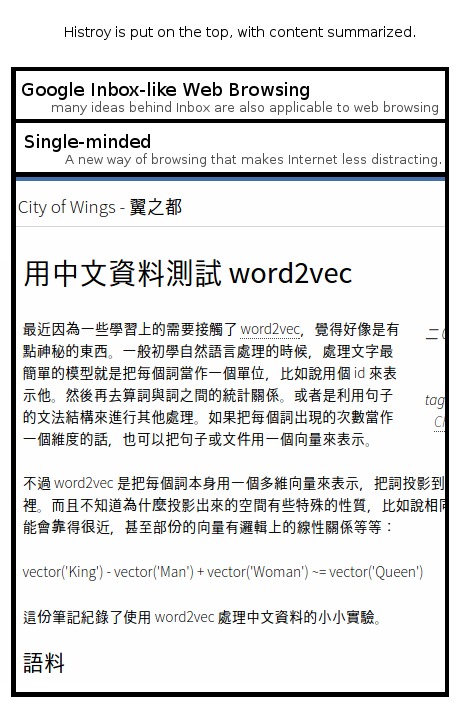Last time, I explored the idea of designing a web browsing UI that reduces the possibility of distractions in 〈Single-minded : an Internet reader, made for readers, made by readers〉. While that idea might sound interesting, the design itself was somewhat primitive. Recently, Google has announced Inbox, a new way to handle email. And I find that many ideas behind Inbox are also applicable to web browsing as well.
Tabs as Threads
For example, different tabs can be represented as different threads, and for each thread, the history can be easily represented as different ’email’ in the same thread.

Such layout provides better navigation for histories than the current design of ‘back’ and ‘forward’ buttons. Sophisticated text summarization techniques can also be used to enable user to get information without actually open that page.
Search as Threads
Not only a tab can be represented as threads, a search attempt can also utilize the thread layout. We simply click on the empty space, and a search input field would appear. After entering the keywords, we click as many results as we like. Each click results in a different ’email’ in the same threads, and we can inspect each one later at any time. We can archive unrelavent pages and decide to mark every remaining results with a label for later use.
Unification of History, Bookmarks, and Tabs
Indeed, every page marked as done (archived) is just like the old history. Every page on the inbox is just like the tabs. And every page with a label is a bookmark. In this way, we unify everything with a consistent and simple UI. We also drastically increase the possibility for the user to utilize bookmark functions.
We Learn Everything, so We Search for You
Since we can safely assume that any pages left in the inbox is something that the user is interested in currently. (Otherwise she should have archived it.) We can actively recommend related pages for different threads. Moreover, for those ‘search threads’, we also have the keywords used, and since the user might try to delete unwanted results from the inbox, we have relevance feedback as well. And latency is no longer an issue, as we can do the search and the show results when the user open the browser next time. So we are able to produce extremely accurate result compared to conventional search engines. And we also have the opportunity to insert related advertisment as well.
However, if we do use this kind of web browsing, our entire browsing history will be on the cloud. Is this acceptable?
